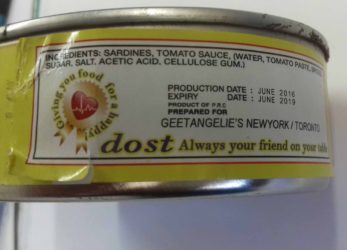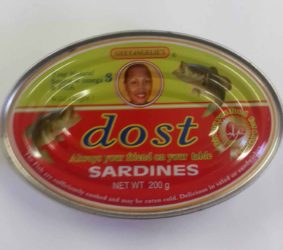Seventeen hundred cases of sardine imported from China were denied entry into Guyana after it was found that the labelling was tampered with and the tins were rusting, the Government Analyst– Food and Drug Department said yesterday.
In a press release, it was stated that the Department in collaboration with the Guyana Revenue Authority’s (GRA) – Customs Department- has refused entry to 1700 cases, each containing 48 tins of 200 grams of Dost sardine imported from China.

“Samples of the imported items were retrieved by Inspectors of the Department for examination on the 29th November 2016. Upon examination, it was revealed that the sardines were manufactured on the 1st August, 2014 (coded information on tins) and not on the 1st June 2016 as stated on the labels, tins were already rusting, the Free Sale/Health Certificate from China FDA was inconsistent with those usually presented to the Department and the exact name and address of the manufacturer were not stated on the labels, which violates the Reg. 18 of the Food and Drug Regulations”, the release said, adding that these were some of the reasons that influenced the Department’s decision.
According to the Department, based on the Inspector’s report and according to the Laws of Guyana, Food and Drug Act Chapter 34:03 section 22 (II) and the Food and Drug Regulations 1977 regulation 11, entry of the product was not granted and the Head of the Customs Department and the importer were officially notified as prescribed for in the law.

The release said the Department will now furnish a copy of the inconsistent Free Sale Certificate, which was used to facilitate the shipment into Guyana with its sister regulatory agency in China.
The name of the importer was not stated but according to the release, the name and address of the exporter and the importer will be provided to the regulatory authorities in China in an attempt to prevent future shipments of substandard foods.
In this regard, the Department is advising consumers to pay close attention to labels for dates, addresses, country of origin, instruction for storage, the language, which must be English and the condition of containers when purchasing items of food at all times.
“The Department will continue to work with all stakeholders to ensure substandard items of foods, drugs, cosmetics and medical devices are prevented from being released on our local market”, the release said.




